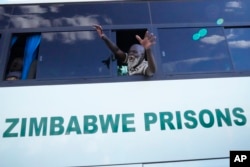Authorities in Zimbabwe Friday started releasing 4,270 prison inmates who were granted amnesty by President Emmerson Mnangagwa earlier this month ahead of general elections.
The development is welcomed because it decongests Zimbabwe's overcrowded prisons.
Pardoned inmates leaving Harare Central Prison Friday did not speak, but joy was written all over many of the prisoners' faces.
Shepherd Mpofu, the acting head of the Zimbabwe Prisons and Correctional Service, is grateful to President Emmerson Mnangagwa for granting the amnesty and reducing the prison population.
He said previous amnesties have shown that few of the inmates will return.
"In the past amnesties that have been granted, we can tell that only 2% or 3%, they are coming back to prison — those who have benefitted from amnesty," said Mpofu. "So by looking at those numbers to say just 3%, they are returning to prison, they are good numbers to show that our rehabilitation activities that are taking place in prison, they (the inmates) are learning more. What I can say to the society is to accept them when they come out."
The president announced last month — on Zimbabwe's independence day - that he would pardon some inmates convicted of minor crimes.
Edson Chihota, who heads the Zimbabwe Association for Crime Prevention and Rehabilitation of the Offenders, an organization that works to rehabilitate prisoners and reintegrate them into society, said many of the released prisoners were forced to commit crimes because of severe poverty.
He welcomes the release of the inmates but said prisons remain overcrowded. He noted that some prisons with a capacity of 17,000 have populations of up to 22,000.
"For us it's something that has been done but does not really alleviate the challenges that are faced by prisons," he said. "We can only say this is meaningful when the number has dropped from 17(000) to 15,000 and below."
Zimbabwe last had a prisoner amnesty in 2020, when the president said it was necessary to decongest prisons during the worldwide COVID-19 pandemic.






